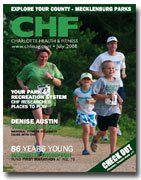
After the big Racefest Half Marathon and 10k this last weekend, I thought it would be good to talk about fueling your body to maximize performance. When to eat, what to eat, how much to eat are all questions that need to be addressed. Anyone who has attempted to do any extended activity without fueling properly can tell you that “bonking” (having your muscles shut down) is about as fun as stubbing your toe on a door jam.
Timing Is Everything
For foods to give you that much-needed boost, you need to eat the right ones at the right time. There's nothing worse than skipping meals. Your body needs fuel, just like a car. If you don't provide it, your body will break down muscle tissue to generate it. And your weight-loss goal should be to increase calorie-burning lean body mass, not lose it.
"Never let your tank get on empty," says Dan Benardot, PhD, RD, FACSM, a nutrition researcher and professor of nutrition at Georgia State University in Atlanta. "It is very important to maintain a normal blood sugar, and the best way to accomplish this is to eat every few hours."
This will help you maintain muscle tissue -- which burns more calories than fat tissue -- while putting the proverbial zip in your step. But don't overdo it. Overeating can be just as bad as starvation, Benardot warns.
"Ingesting large quantities of food stimulates insulin production and the deposition of fat," he says.
The challenge is to be prepared and to carry healthful snacks with you so you don't go for long periods of time without fuel for your tank. Portable combinations of complex carbs and lean protein -- like low-fat cheese and whole-grain crackers, whole fruit and a handful of nuts, or a low-fat granola bar -- are great munchies for energy. Store them in your purse or briefcase so they're always handy.
Fire Up the Engine
The carbohydrates, proteins, and fats in food provide calories to fuel exercise and energize your body. Contrary to myth, vitamins and minerals do not themselves provide any energy. (They are, however, involved in the process of converting nutrients into fuel for energy and are an important part of a healthy diet.)
Carbohydrates are the body's preferred form of fuel because they can be quickly converted to glucose for energy. Eating a light snack of carbohydrates right before exercise is a good idea for quick energy.
For longer-lasting energy, eat protein along with the carbs to slow down the rate at which your body absorbs them. But be sure you don't include too much fat.
"Any food with calories will give you energy; however, foods high in fat stimulate production of serotonin, [a brain chemical] that can make you feel sluggish and tired," according to Benardot.
So mixed meals that contain small amounts of healthy fats, along with protein and complex carbohydrates, are the foundation for an energizing diet.
High-Octane Foods
The best energizing foods are those that are rich in complex carbohydrates, protein, antioxidants, fiber, vitamins, minerals, and other health-promoting substances. Put these foods together along with small amounts of healthy fats for a balanced diet that is sure to provide you energy all day long.
Here are a just a few of the energizing foods that will do your body good. As long as you don't eat them in excess, these foods will make you feel lighter -- and more inspired to move around.
- Blueberries
- Beans
- Cantaloupe
- Strawberries
- Mango
- Spinach
- Salmon
- Nuts
- Tea
- Tomatoes
- Soy
- Low fat dairy products
- Oatmeal
- Whole grains
- Citrus fruit
- Peppers
- Sweet potatoes
Start off your new year eating small, healthful meals more often, and see how much better you feel. You'll gain energy, helping you to approach each new day with a renewed feeling of optimism and enthusiasm. And what have you got to lose, except maybe a few pounds?
Adopted from: Kathleen Zelman, MPH, RD, LD
WebMD Weight Loss Clinic - Expert Column






No comments:
Post a Comment